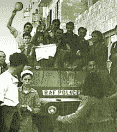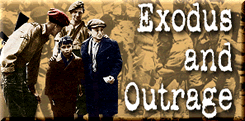Exodus to Independence
At the end of the Second World War, the Arab population in Palestine was quiet, trusting in the British and the newly created United Nations to protect their interests. But the Holocaust in Europe had engendered a passionate desire amongst the Jewish community for the immediate creation of a Jewish state which could accommodate the survivors and ensure that there was a haven for all Jews for all time. Jewish guerilla and terrorist activity directed against the British, not the Arabs, rapidly spread and the large British garrison could do little more than contain it.

Britain was under domestic pressure to bring the boys home, harried by Washington and European government to meet Zionist aspirations in the face of the appalling horrors of post-Holocaust Europe. Unable to find a political solution and confronted by implacable Arab opposition to a Jewish state of any kind in Palestine, Britain threw in the towel. Foreign Secretary Ernest Bevin announced in February 1947 that the British government had decided to refer the Palestine problem to the UN.
On 15th May 1947 a special session of the General Assembly decided to establish an eleven-member Special Committee on Palestine (UNSCOP) to study the problem and to report. The endeavour to achieve impartiality resulted in a curious composition. This committee was comprised of members from Australia, Canada, czechoslovakia, Guatemala, the Netherlands, Peru, Sweden, Uruguay, India, Iran and Yugoslavia.
The Committee visited Palestine in June and July. The Arab leadership boycotted the committee which had wide and detailed discussion with the whole spectrum of Jewish groups. The internal security situation in the summer of 1947 was unsettled.
UNSCOP submitted two reports at the end of August. The majority report was signed by seven of the participants and the minority by three others, with Australia remaining neutral. The minority recommended a neutral federal state with Jerusalem as its capital, while the majority recommended partition with Jerusalem under International Trusteeship.

The majority report was put to the vote in the Special Committee of the General Assembly on 25th November and was approved by 25 votes to 13 with 17 abstentions, falling one short of the two-thirds majority required for adoption. After frenzied lobbying and amid scenes of wild excitement, the resolution was scraped through a Plenary session on 29th November. Arm twisting by and large had induced certain states to change their votes and the result was 3 to 13 with 10 abstentions, the two-thirds majority had been achieved. The Jewish leadership immediately accepted the result and the Arabs rejected it. All Arab and Moslem delegations voted against and walked out. Britain abstained, making clear that it would not assist in the implementation of a plan which could only be put into effect by force.
UN troops moved in and the British troops pulled out, and on 14th May the British High Commissioner and his staff left Haifa by warship. The State of Israel was proclaimed and immediately recognized by the United States and the Soviet union. UNSCOP was disbanded and a mediator was appointed in its place to promote a peaceful solution.



